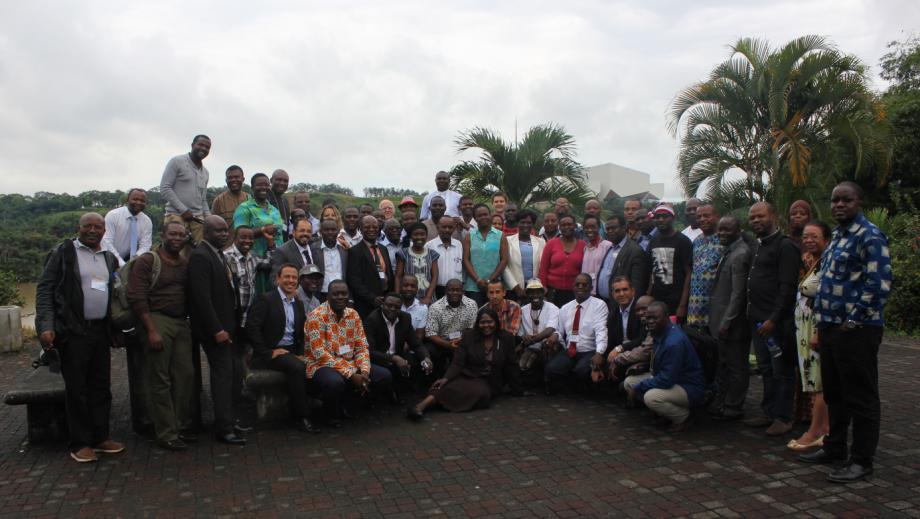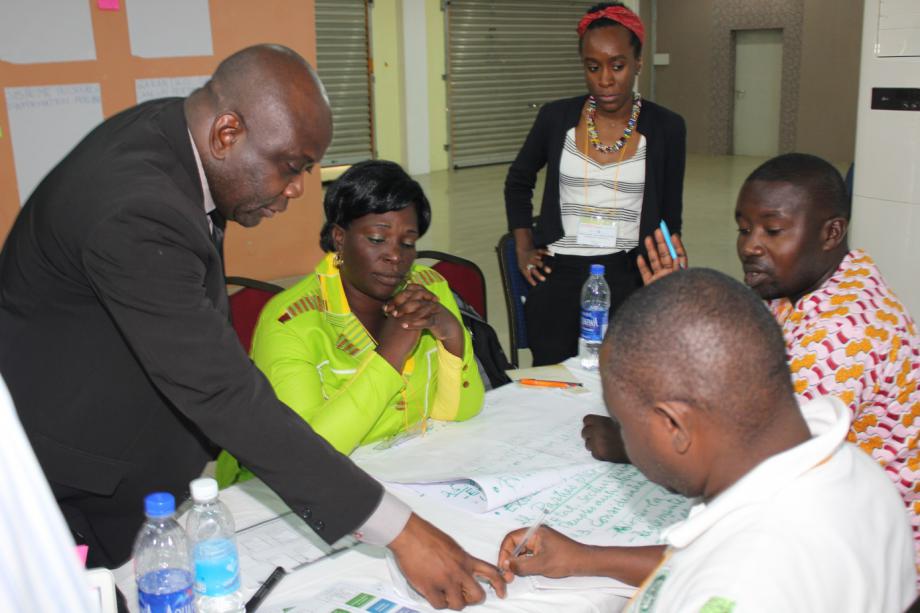Launch of the REDD+ Academy e-Course and Learning Journals
REDD+ Academy trains more than 500 from 49 countries in Asia Pacific, Africa and Latin America and the Caribbean – and it is now available from the comfort of your home!
25 November, Calabar, Nigeria - A year ago, the UN-REDD Programme launched the first REDD+ Academy in order to match the scale of the global climate change mitigation challenge and enable systematic, focused capacity development to deliver REDD+ on the ground. Since then the REDD+ Academy has reached over 500 people through three regional iterations (Asia-Pacific, LAC and Africa) and successive national training sessions.
During the last training event – held in Calabar, Cross River State, Nigeria, from 28 October to 05 November – more than 60 representatives from government, civil society, indigenous peoples and academia from 24 UN-REDD partner countries have completed the regional REDD+ Academy training session for Africa. This eight-day workshop guided participants through twelve REDD+ key themes through a highly interactive learning approach. This was the second REDD+ Academy event of the month, following a similar event for the LAC region, held in Iguazú National Park, Argentina, which involved 45 participants from 12 countries. The trainings were organized by the UN-REDD Programme and its agencies (FAO, UNDP and UNEP), with support from the UN CC:Learn Secretariat hosted by UNITAR.

Sharing skills
The REDD+ Academy training session for Africa was based on dynamic and interactive activities that promote knowledge and experience sharing among participants. Over 95% of participants found the Training of Trainers (ToT) component very relevant in providing tools to better meet the capacity building needs for the preparation and implementation of REDD+ in their national contexts.
Participants agreed on the need to continue providing opportunities for exchange and interaction between countries on their different experiences of REDD+ implementation through the UN-REDD Programme, and many of them noted with great interest the potential of running national versions of the REDD+ Academy. Participants expressed satisfaction with the REDD+ Academy curriculum and learning materials, saying they provide “very complete information on the various REDD+ topics”, with over 95% of them stating that the content of the training was relevant to facilitate their role in the REDD+ readiness and implementation processes in their countries.

REDD+ Academy Learning Journals
To support continued learning both during the REDD+ Academy training sessions and beyond, the UN-REDD Programme and its agencies (FAO,UNDP and UNEP), with support from the UN CC:Learn Secretariat, are pleased to launch the first edition of the REDD+ Academy Learning Journals. Addressing twelve key topics in REDD+, the Learning Journals are a coherent bundle of introductory information, detailed accounts and learning exercises designed to build capacity for REDD+ throughout the world.
The Journals walk learners through the landscape of REDD+, from the carbon cycle and drivers of deforestation to approaches to finance and stakeholder engagement. The Journals also explore technical issues, such as the establishment of national forest monitoring systems and processes to address REDD+ safeguards.
Designed to be used either as a complete course or as individual modules depending on the learners’ interest, the REDD+ Academy Journals offer a level of comprehensiveness and flexibility that matches the diverse needs of REDD+ practitioners.
They consists of twelve modules: Forests, Carbon Sequestration and Climate Change; REDD+ and the UNFCCC; Drivers of Deforestation and Forest Degradation; National Strategies and Action Plans; National Forest Monitoring Systems (NFMS); Forest Reference (Emission) Levels (FREL/FRLs); Policies and Measures for REDD+ Implementation; REDD+ Safeguards under the UNFCCC; REDD+ Finance; Approaches for Allocation of Incentives; Introduction to Stakeholder Engagement; and Good Governance.
The Journals are available online in English, French and Spanish on the UN-REDD workplace and on the UN CC:e-Learn platform.
For more information please contact:
Mihaela Secrieru, REDD+ Academy Coordinator, at Mihaela.Secrieru@unep.org
Vincens Côté, UN CC:Learn Secretariat, uncclearn@unitar.org
The REDD+ Academy e-course
In order to widen the reach of the REDD+ Academy trainings and grant access to high quality learning on REDD+ to an unlimited number of participants, the UN-REDD Programme is also pleased to launch the REDD+ Academy e-course, developed with support from the UN CC:Learn Secretariat.
Based on the learning materials developed for the face-to-face REDD+ Academy sessions, as well as input from Academy participants, the REDD+ e-Academy is a self-paced e-learning course open to all, free of charge and available on the UN CC:e-Learn platform and accessible from the UN-REDD workspace.
In describing the REDD+ Academy learning materials, Achim Steiner, United Nations Under-Secretary-General and United Nations Environment Programme Executive Director stated, “The modules presented in the e-Academy will equip you with the requisite knowledge to better understand the various components of REDD+ planning and implementation, and provide you with tools to promote the implementation of national REDD+ activities in your country. I encourage all of you to apply the knowledge you will gain over the course duration and to do your part to make REDD+ a national and a global success!” (Watch the video).
About the REDD+ Academy
The REDD+ Academy is a coordinated REDD+ capacity development initiative led by the UN-REDD Programme and the UNEP Environmental Education and Training Unit, which seeks to match the scale of the global climate change mitigation challenge and enable systematic, focused capacity development to deliver REDD+ on the ground. The REDD+ Academy is a comprehensive response to capacity building needs identified by the countries receiving support from the UN-REDD Programme. The main aim of the REDD+ Academy is to empower potential “REDD+ champions” with the requisite knowledge and skills to promote the implementation of national REDD+ activities.
About UN CC:Learn
UN CC:Learn is a partnership of more than 30 multilateral organizations supporting countries to design and implement systematic, recurrent and results-oriented climate change learning. At the global level, the partnership supports knowledge-sharing, promotes the development of common climate change learning materials, and coordinates learning interventions through a collaboration of UN agencies and other partners. At the national level, UN CC:Learn supports countries in developing and implementing national climate change learning strategies. Through its engagement at the national and global levels, UN CC:Learn contributes to the implementation of Article 6 of the UNFCCC on training, education and public awareness-raising, and the 2012-2020 Doha Work Programme. Funding for UN CC:Learn is provided by the Swiss Government and UN partners. The Secretariat for UN CC:Learn is hosted by the UN Institute for Training and Research (IUNITAR).
About the UN-REDD Programme
The UN-REDD Programme is the “United Nations Collaborative Programme on Reducing Emissions from Deforestation and Forest Degradation (REDD+) in Developing Countries”. The Programme was launched in 2008 and builds on the convening role and technical expertise of the Food and Agriculture Organization of the United Nations (FAO), the United Nations Development Programme (UNDP) and the United Nations Environment Programme (UNEP). The UN-REDD Programme supports nationally led REDD+ processes and promotes the informed and meaningful involvement of all stakeholders, including indigenous peoples and other forest-dependent communities, in national and international REDD+ implementation.I
Photo 1: Trainees at the REDD Academy regional training session for Africa
Photo 2: Sharing knowledge at the Africa REDD Academy training session

